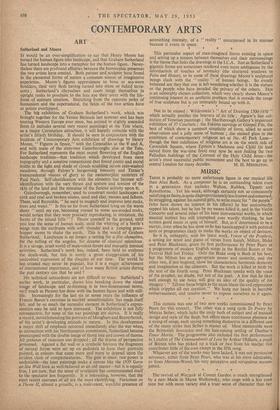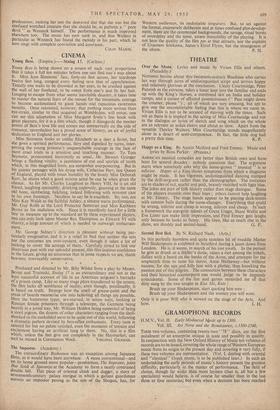MUSIC
THERE is probably no more unfortunate figure in our musical life than Alan Bush. As a composer he is an outstanding talent even in a generation that includes Walton, Rubbra, Tippett and Rawsthorne. Yet his work, although certainly not so consistently satisfying as theirs, is quite disproportionatelyless known and esteemed. In struggling, against his natural gifts, to write music for "the people" (who have shown no interest in his efforts) he has undoubtedly sapped his talent, but he has by no means killed it, and in the Violin Concerto and several other of his later instrumental works, in which musical instinct has still triumphed over woolly thinking, he has written good music in spite of himself. ,But, as if determined to be a martyr, even when he has done so he has handicapped it with political texts or programmes likely to make the Works an object of derision. So it is, unhappily, with his latest work, Voices of the Prophets, a setting for tenor and piano of verses from Isaiah, Milton, Blake and Peter Blackman, given its first performance by Peter Pears in a programme of modern English songs in the Recital Room at the Festival Hall last Friday. Only the Blake song is Bush at his best, but the Milton has an appropriate power and austerity, and the other two, if not inspired, show his characteristic harmonic dexterity and imagination at the climaxes. But the work is killed at birth by the text of the fourth song. Peter Blackman speaks with the voice of the prophet, no doubt, but not of the poet. A line that he likes well enough to use twice will give an idea of the quality of his imagery : " Till our force bright as the atom blasts the evil oppression which cripples all our creation." We hang our heads in horrible embarrassment, and resolve never to expose ourselves to it again.
This cantata was one of two new works commissioned by Peter Pears for this concert. The other was a song cycle To Poetry by Matyas Seiber, which lacks the unity both of subject and of musical design and style of the Bush, but offers more continuous pleasure as a string of songs, each saying something distinctive in a different one of the many styles that Seiber is master of. Most memorable were the Brittenish Invocation and the hair-raising setting of Dunbar's Timor Mortis. The programme also included the first performance in London of The Commandment of Love by Arthur Oldham, a pupil of Britten who has picked up a trick or two from his teacher but contributes little of his own except in the fifth song.
Whatever any of the works may have lacked, it was not persuasive advocacy, either from Peter Pears, who was at his most admirable, or from Mewton-Wood, his very perceptive and scrupulous accom- panist.
The revival of Wozzeck at Covent Garden is much strengthened by a new Marie in Marea Wolkowsky, who sings with a less even tone but with more variety and a truer sense of character than her predecessor, making her not the depraved slut that she was but the confused wretched creature that she should be, as pathetic a " poor devil " as Wozzeck himself. The performance is much improved elsewhere too. The music has now sunk in, and Jess Walters in particular as Wozzeck has found the melody in his part, which he now sings with complete conviction and assurance. COLIN MASON.



































 Previous page
Previous page